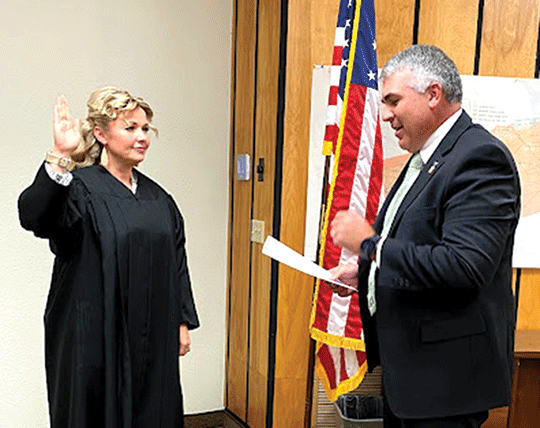
OATH OF OFFICE • Barbara Finlinson was sworn in as the Juab County Justice Court Judge by 4th District Court Judge Jared Eldridge.
By Myrna Trauntvein
TN Correspondent
In a ceremony held at Juab County Commission meeting, Barbara Afton Finlinson took the oath of office as administered by Fourth District Court Judge Jared Eldridge and is now the Juab County Justice Court Judge. Finlinson was also recently sworn-in as the Nephi City Justice Court Judge. “I appreciate your being here, Judge Eldridge,” Finlinson said. Eldridge said that he was happy to perform the ceremony and that he appreciated being invited back to county commission meeting where he had spent so many hours when he was the county attorney. “We are looking forward to working with you,” said Clinton Painter, Juab County commissioner. “Congratulations to you.” Finlinson took the oath of office in front of friends and relatives in the noon ceremony. “We will be working with you in justice court,” said Ryan Peters, Juab County attorney. “We want to congratulate you on becoming our justice,” said Marvin Kenison, commissioner. The justice court position is shared by Juab County and Nephi City, said Painter. Finlinson is an attorney and graduated from Brigham Young University’s (BYU) J. Reuben Clark Law School in 2018. While a student, Finlinson was awarded the BYU Alumni and Clark Law School Replenishment Full Scholarship by faculty nomination during her third year. During her time at law school, she served as the Mother’s Representative for BYU Law’s Women in the Law organization and advocated for mothers at the law school. She also served as the President of BYU Law’s Environment, Energy and Resources organization. In that role, she organized and hosted events in cooperation with legal practitioners within those fields of law to provide presentations and further education for students at the law school in those areas of law. Finlinson was hired as a law clerk at the Utah County Attorney’s office in September of 2016 while still in law school. She served in that capacity until she was admitted to the Utah State Bar in September of 2018. At that time, she was hired as a Deputy County Attorney and practiced law as a prosecutor for three years. She prosecuted criminal cases in the Utah County Justice Court as well as Utah’s Fourth District County in Provo. During that time, she also served as the head prosecuting attorney in the Fourth District Court’s Mental Health Court program. In that capacity, she worked with the judge, defense attorney and administrators at the Utah County Attorney’s Office to change screening protocols in order to allow easier program access for individuals struggling with mental illness. During that time, she was able to fill the Mental Health Court program to capacity. Prior to law school, Finlinson graduated summa cum laude with a 4.0 GPA from Utah Valley University (UVU) in 2014. She earned a bachelor of science degree in the field of Communications and was presented with the Outstanding Graduate Award representing UVU’s communications department. “I grew up in Oak City and I am the mother of nine children in a blended family,” she said. She is the wife of Rust Finlinson, Nephi City’s Power Superintendent. She said that she loves sewing and playing the piano. Last May, the Juab County Nominating Commission selected four nominees for the judicial vacancy to serve Juab County and Nephi City. The position replaced Judge Sharla Williams who passed away in November 2020. The final candidate was selected by the Juab County Commission and Nephi Mayor Glade Nielson. “All justice court judges must be approved by the Judicial Council, the governing body of the judiciary,” said Painter. Utah State Code requires that each judicial appointee is subject to an unopposed retention election in the first general election held at least three years after the judge was appointed. That year becomes their “retention year” and sets their evaluation cycle with the Judicial Performance Evaluation Commission. Justice court judges face a retention election every six years. Justice Courts are established by counties and municipalities. They have the authority to deal with Class B and C misdemeanors, infractions, violations of city/county ordinances, and small claims under $11,000. Justice Court judges need not be attorneys, although they receive extensive training and 30 hours of continuing education each year to remain certified.
|